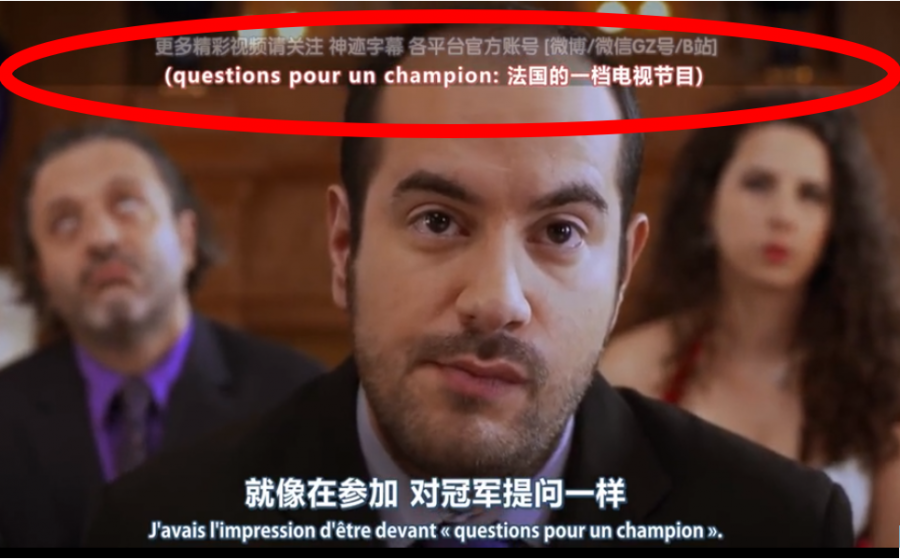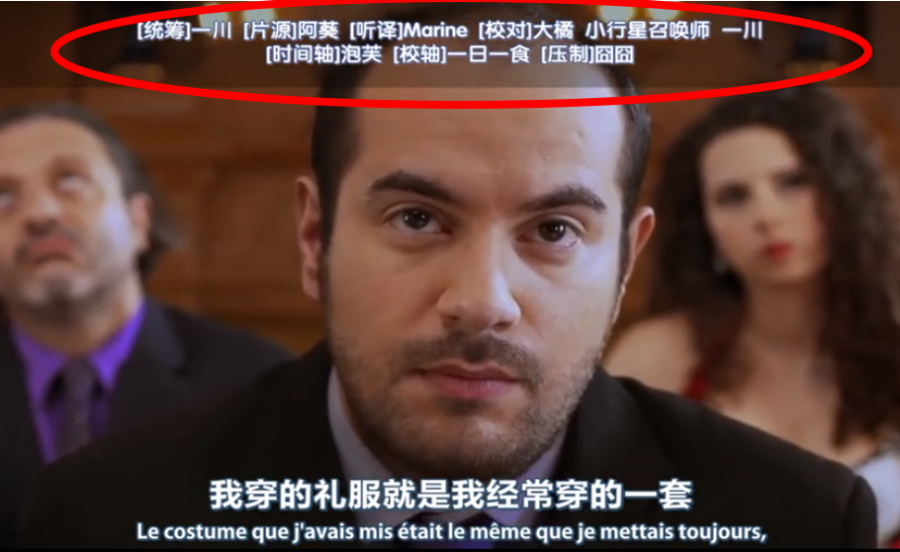
Fansubbers in China: A “Promethean community” in a gray zone
Fansubbing in China has invoked both admiration and criticism from society. Fansubbers help import global cultural products to China, however, the legitimacy of fansubbing is controversial, especially when it comes to issues of copyright protection and translation validity. This article takes a controversial case in China as a starting point to explore how fansubbers perform and make themselves recognizable in the digital space. Further, by investigating fansubbers' negotiation of language translation and marketization, this article questions and discusses the legitimacy of fansubbing in contemporary society.
Fansubbers in China: A Promethean Community?
With their increasing visibility in today’s online cultural market, the fansubbing community in China induces both admiration and criticism from the public. Fansubbing is the process of fans translating and subtitling various types of audiovisual material into a language other than the original (Zhang, 2013). Having emerged through online platforms and social media, fansubbers not only translate subtitles but also translate different cultures and social contexts, sharing their knowledge and understanding with their audiences and fellow fansubbers.
In this sense, they can be considered a super-diverse community consisting of ‘cultural transmitters’ in the digital era. However, as an inter-cultural practice in the liberal market of cultural products, fansubbing also raises questions, from copyright issues to translation strategy, translation authority, and hidden language markets. In other words, the fansubbing community can be controversial.

Figure 1. In 2014, one of the most popular fansubber groups in China, YYeTs, announced its temporary closure to 'clean up' its contents.
Fansubbing is a global phenomenon, and China in particular showcases a debatable perspective on the role of fansubbers. Since the 1999 WTO agreement, China can only import a limited number of foreign cultural products such as films and TV series (Zhang, 2013). Fansubbers who translate additional foreign products into Chinese also bring uncensored cultural materials to Chinese audiences. Despite concerns about copyright violation, they are often portrayed as Prometheus stealing the digital era's proverbial fire (Wang & Zhang, 2017, p. 309). They smuggle cultural products into Chinese online spaces, risking breaking the law. This figurative image – the theft of fire— of Chinese fansubbers not only illustrates their socio-cultural role, but more noticeably, unveils fansubbers' cultural authority.
From audio-visual products to literal publication, fansubbers seem to have built their cultural authority through their social media influence outside the scope of the official translation.

Figure 2. Gudabaihua (at the bottom right) was invited by Chinese national movie channel to translate and explain the Oscars ceremony of 2020. In this scene, he is explaining the history and culture behind the awarded movie Green Book.
Given the limited import of cultural products, fansubbers' contributions could enrich the Chinese market by mobilizing and translating materials for digital Chinese spaces. However, when fansubbers serve as mediators between untranslated material and Chinese audiences, the validity and authority of fansubbers' translations come into question. How have fansubbers’ translations become well-received and considered valid among audiences? And how have fansubbers become trustworthy and authoritative in digital communities?
Fansubbers: Translators and Creators
Having developed over nearly two decades, Chinese fansubbing has built up its own patterns of cultural transmission, serving as both language translation and creator of cultural references. Through case studies of the fansubbed French comedy Brief, Japanese animation Initial D, an American sitcom 2 Broke Girls, this article explores the patterns and creations of fansubbers in their practice of annotation, creation of phonetics, self-regulation of language, and appropriation of social-cultural contexts.
Since subtitles are often the only resource for audiences, the power of annotation is exerted by fansubbers to establish their authority in relation to their audiences.
The process of fansubbing goes beyond literal translation to establish mutual understanding between different cultures. Fansubbers' subtitles are often accompanied by annotations for cultural references such as idioms, buzzwords, trending phrases, historical events, and socio-political contexts. Take the French comedy Brief as an example (see figure 3): fansubbed annotations at the top of the screen explain in Chinese that "Questions Pour un Champion" is a French game show. In this scene, the game show is a metaphor for the tiresome questions and doubts the protagonist faces. Therefore, the annotation not only provides a literal translation but more importantly helps audiences understand the metaphor and thus make sense of the scene. Importantly, fansubbers’ annotation is often based on their own information and knowledge, but is presented in the frame of subtitles. Since subtitles are often the only resource for audiences, the power of annotation is exerted by fansubbers to establish their authority in relation to their audiences.

Figure 3. The cultural reference of ‘Questions Pour un Champion’ was explained in Chinese on the top of the scene.
When Soramimi happens on Chinese fansubbed ‘Deja Vu’, the phonetic meaning weighs over the literal meaning.
When a subtitle doesn't make sense unless read out loud, a phonetic translation often functions better than the literal meaning. Soramimi is a Japanese term for homophonic translation of song lyrics, that is, translating lyrics in one language to similar-sounding lyrics in another language. For example, the Japanese animated racing series Initial D uses background music containing the french phrase déjà vu, meaning the feeling of having lived through a situation before. In the Chinese fansubbed version, the phonetic translation of déjà vu outweighs the literal meaning. It is phonetically translated into Chinese as ‘逮(dai)虾(xia)户(hu)': phonetically close, but literally meaningless.
Two possible functions of ‘逮(dai)虾(xia)户(hu)’ could be seen here: first, to amuse audiences with a phonetic translation of ‘Déjà vu’’; second, to create a new online buzzword among Chinese audiences. As such, the French phrase “Déjà vu” is deprived of its original meaning by the fansubbed version. In this case, we can observe how the Chinese translation “逮(dai)虾(xia)户(hu)” popularizes a deliberate mistranslation. More significantly, it shows that when a phonetic convenience and entertaining translation become popular among audiences, mistranslation is functionally acceptable. In other words, the accuracy of translation could give in to convenience and entertainment.

Figure 4. A bilingual Soramimi translation of Deja vu serves better for the entertaining function
Fansubbers often deploy buzzwords and create euphemisms to negotiate cultural taboos and language translation in the Chinese context.
In the socio-cultural context of mainland China, certain topics, especially those subject to cultural taboos, require moderation before being shown to the public. As a result, fansubbers often use buzzwords or euphemisms to negotiate cultural taboos in their translations.
Sexual content is often regarded as taboo in Chinese public spaces. Hofstede's cultural dimensions theory suggests that this could be explained by the high restraint and indirectness index in Chinese culture, where personal enjoyment and desire should be constrained (Hofstede, G. 2009). From this perspective, translating sexual conversation into Chinese requires both awareness of cultural differences and creativity of euphemism. Thus, it is inappropriate to translate the original French ‘faire I’amour’ directly to ‘做爱(having sex).'
Instead, it is translated as ‘applause for love’ (figure 5). This translation not only euphemizes the taboo content, but more wittily, it resonates with a Chinese buzzword "啪啪啪" (an onomatopoeia for clapping and slang for having sex). By doing so, fansubbers negotiate the cultural taboo and translation, accomplishing both cultural acceptance and understanding of sexual content in the Chinese context.

Figure 5. The use of euphemism in translating ‘faire I’amour’ in French comedy Brief.
By giving audiences familiar Chinese context clues, the translation achieved a better interculturality than a word-for-word translation.
Apart from euphemisms, fansubbers also use analogies to translate unfamiliar language use. In a scene from 2 Broke Girls (figure 6), the protagonist Max uses exaggerated manners, gestures, and language to serve an over-dressed gentleman, calling him "my good man." A similar concept of ‘good man’ exists in Chinese, and fansubbers therefore referred to ancient Chinese society etiquette. They replace the direct translation, ‘我/I’ and ‘你/thee,’ with the honorifics ‘吾(I)’ and ‘汝(thee).’ By giving audiences familiar Chinese context clues, the translation achieved better interculturality than a word-for-word translation.

Figure 6. fansubbing bridging the etiquette in both American and Chinese context
Fansubbers and Superdiversity
Given fansubbers' linguistic creativity, fansubbing groups often have a signature translation style or recognizable design. Additionally, since fansubbers primarily operate on social media and interactive online platforms such as bilibili.com, the social role of fansubbers goes beyond mere fans or subtitle makers. Many fansubbing groups have accumulated a large number of followers – the translators themselves have fans. This highlights three major themes in sociolinguistic studies of superdiversity:
If superdiversity is meant to become ‘a theoretical perspective on language and social life’, it may require handling at least three things: (a) the further conceptualization of superdiversity as ‘super-connectivity’, doubling our ethnographic interest in (b) the production of new or emerging cultural (religious, communicative, semiotic, social, …) forms and practices and (c) the formation of new socialities which add to people’s potential for subjectification (Arnaut et al, 2016, pp 8).
The Chinese-oriented fansubbing community consists of fans both in China and overseas, and is therefore defined by its transnational ‘super-connectivity’. According to above quote, this super-connectivity brings us not only new forms of language but also new socialities among fansubbers, enhancing their potential for subjectification. In particular, it could serve as a vantage point to zoom in on fansubber groups' self-representation in order to dissect their identity and agency.
Representations of fansubbers emphasize the self-fashioning element and the teamwork division.
Fansubbers are self-aware of their own representation and therefore intentionally make themselves recognizable to audiences and followers. For example, the French fansubbing group FSOGSUB GROUP (figure 7), embeds running credits with pseudonyms, language-learning motivation, and self-promotion in their subtitled media.

Figure 7. In the fansubbed French comedy Brief, the running credits of fansubbers with different tasks are acknowledged at the beginning of every episode.
Fansubbers usually use a pseudonym in the running credits. In the fansubbed French comedy Brief, running credits of each team member's tasks are acknowledged at the beginning of every episode. Instead of real names, self-fashioned pseudonyms are used. For example, the fake name Marine refers to the fansubber responsible for listening and translation. Marine is not a Chinese name or the full name of the translator. But it shows the ability to pick a meaningful non-Chinese name for herself – self-naming shows how the fansubber wants to be recognized and remembered.
The other example in figure 7 are the proof-readers. There are three names: 大橘, 小行星召唤师, and 一川. For Chinese audiences, these three names are obvious nicknames and commonly used in digital social environments. Their literal meanings are big orange (大橘), asteroid summoners (小行星召唤师), and one river (一川). Through this example, representations of fansubbers emphasize the self-fashioning element and the teamwork division. Furthermore, this reassigned-identity can serve as purposive self-branding for the FSOGSUB GROUP.
While similar to running a commercial, the purpose is to expand the fansubbing community instead of selling products.
Self-promotion and self-branding is a major feature of fansubbers' self-representation. If the use of pseudonyms is seen as personal branding for individual fansubbers, then group branding can be regarded as promotion for the whole fansubbing team, with the aim of expanding their followers and recruiting new team members. In the case of FSOGSUB GROUP, they put a sophisticated advertisement before each episode of Brief (figure 8). While similar to running a commercial, the purpose is to expand the fansubbing community instead of selling products.

Figure 8. The logo of FSOGSUB GROUP which is specifically designed for the advertisement.
The above screenshot presents the logo of FSOGSUB GROUP. Written in traditional calligraphy, the Chinese name of the fansubbing group, 神跡, is highlighted with a feeling of mystery. Immersed in a drop of ink, 神跡, literally means the trail of god, projecting a charismatic image. Apart from the logo, a description indicates that it is the third anniversary of the group, implying a yearly celebration. As such, fansubber groups not only position themselves as savvy cultural transmitters but also as highly aware of their public image through and purposive branding and design. This brings us to the third feature of their representations, the ability to mobilize languages.

Figure 9. By providing the QR code of their group, audiences and language fans are invited to attend their online tutorial for free.
Recalling the definition of fansubbing, fansubbers are often fans living abroad or those in China but savvy with foreign cultures and languages. This description of their identity implies their cultural ability to use foreign languages. Regarding the self-promotion of FSOGSUB GROUP, this ability is at the very core of their branding and community expansion. In the advertisement clip, despite the highlighted logo, it also displays a collage of promotional lines. These lines explicitly illustrate the purpose and motivation of the group: a strong passion for language learning and translation. The QR code (figure 9) provided invites audiences and language fans to attend their online tutorial for free, similar to the commercials for language learning classes in the offline world. The rapid pace of moving images and the constant rotation of advertising lines make the self-branding audio-visually spectacular and attractive to the audiences.
Fansubbers in the poesis-infrastructure nexus
While fansubbing is seen as athe creative practice, or poiesis (Calhoun et al., 2013), of a new digital identity and new language in the era of digitalization, the formal subtitles and translation still demarcate normativity and legitimacy in the realm of intercultural products. This confrontation is intensified by its infrastructure – the voluntary labor market in the digital world. In this poiesis-infrastructures nexus, poiesis of the fansubber is not only in itself ‘a concrete human activity’ of ‘how things are actually created”, but also, is constrained by the ‘infrastructure’ of the digital world (Calhoun et al., 2013, p. 195).
In other words, fansubbing is enabled and at the same time constrained by its infrastructure and mechanism. Particularly in the era of digitalization, though fansubbers exert grassroots cultural agency outside the scope of official translation, they are at the same time severely questioned by the public regarding their translation strategy and commercialization. Further, with their increased visibility in today’s cultural market, they are also challenged by the industrialization of translation.
Traditional translation is often required to be faithful to the original text. However, the fansubbing cultural practice is a well-organized grassroots translating practice. Therefore, fansubbing practice could easily mitigate or ignore compliance with translation principles such as accuracy and faithfulness. Instead, fansubber's translations rely more on the intercultural, phonetic, and entertaining function of the text. Thus, some fansubbing could be seen as linguistically mismatched, but functionally acceptable.
Additionally, how fansubbers operate as producers of cultural media is also problematic. Habermas and McKee point out that prevailing commercialization in media culture could paralyze audience agency by filtering and spreading information to targeted audiences (McKee,2005). In the case of fansubbing, it is utopian thinking to treat the fansubber as Prometheus the selfless-fire-thief. Within the Habermasian paradigm, when fansubbers become branded and followed by targeted audiences and fans, fansubbers could be easily transformed from cultural transmitters to cultural filters. By filtering, they select and migrate cultural products following the popularity principle (van Dijck & Poell, 2013).
The criteria of content selection and language translation become intertwined with the marketization of popular culture and audience preference. Beneath this filter is the disproportionate language market among Chinese audiences. American TV dramas hold a major percentage of the market and the visibility of other languages is relatively low. From the perspective of language, fansubbing groups' commercialization and media selection intensifies an already unbalanced language market, further marginalizing minority languages and cultures.
Finally, when fansubbing crossed the line between a fan’s voluntary contribution and an organized group practice, a gray zone emerged. In this gray zone, fansubbers' demand acknowledgment, but their struggle between becoming public and staying unknown also unveils their resistance to unrewarded labor. Instead of being generous and invisible volunteers behind the screen, they now demand legitimate identification to support their work in the digital industry, where languages and cultures have become commodities. Resonating with the nexus of poiesis and infrastructure, this gray zone – the negotiation and conflict between the legal system and the fansubber community – requires future research to explore the interplay between normativity of fansubbing and governmental regulations.
References
2 Broke Girls. USA: Michael Patrick King Productions, Warner Bros. Television
Arnaut, K., Karrebæk, M., & Spotti, M. (2016). Engaging superdiversity: The poiesis-infrastructure nexus and language practices in combinatorial spaces. Engaging superdiversity: Recombining spaces, times and language practices, 7, 1.
Brief. France: Canal+ Group.
Calhoun, C., Sennett, R. and Shapira, H. (2013) Poiesis means making. Public Culture 25 (2), 195–200.
Global Times (2018). Japan cracks down on Chinese fansub groups that provide unauthorized subtitled anime
Hofstede, G. (2009). Geert Hofstede cultural dimensions.
Initial D. Japan: Prime Direction
McKee, A. (2005). The public sphere: An introduction. Cambridge University Press.
Van Dijck, J., & Poell, T. (2013). Understanding social media logic. Media and Communication, 1(1), 2-14.
Wang, D., & Zhang, X. (2017). Fansubbing in China: Technology-facilitated activism in translation. Target. International Journal of Translation Studies, 29(2), 301-318.
Zhang, X. (2013). Fansubbing in China. MultiLingual, Jul-Aug, 30-37.